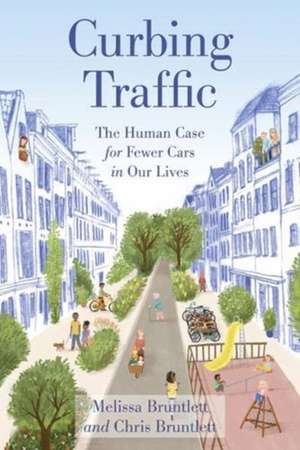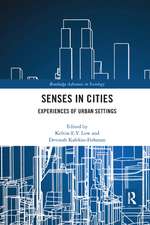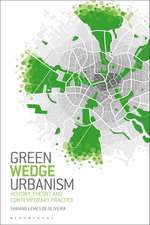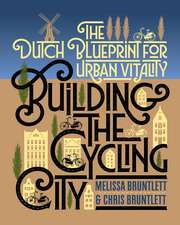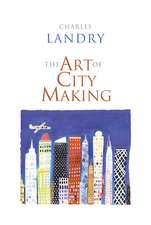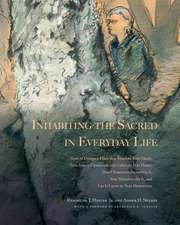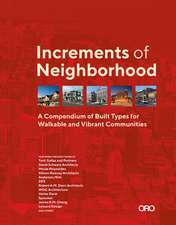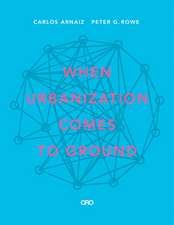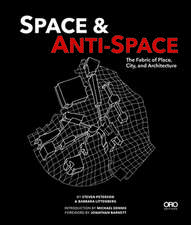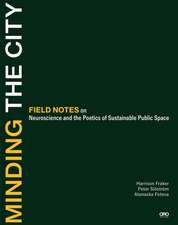Curbing Traffic: The Human Case for Fewer Cars in Our Lives
Autor Chris Bruntlett, Melissa Bruntletten Limba Engleză Paperback – 29 iun 2021
In 2019, mobility experts Melissa and Chris Bruntlett began a new adventure in Delft in the Netherlands. They had packed up their family in Vancouver, BC, and moved to Delft to experience the biking city as residents rather than as visitors. A year earlier they had become unofficial ambassadors for Dutch cities with the publication of their first book Building the Cycling City: The Dutch Blueprint for Urban Vitality.
In Curbing Traffic: The Human Case for Fewer Cars in Our Lives, Melissa and Chris Bruntlett chronicle their experience living in the Netherlands and the benefits that result from treating cars as visitors rather than owners of the road. They weave their personal story with research and interviews with experts and Delft locals to help readers share the experience of living in a city designed for people.
In the planning field, little attention is given to the effects that a “low-car” city can have on the human experience at a psychological and sociological level. Studies are beginning to surface that indicate the impact that external factors—such as sound—can have on our stress and anxiety levels. Or how the systematic dismantling of freedom and autonomy for children and the elderly to travel through their cities is causing isolation and dependency.
In Curbing Traffic, the Bruntletts explain why these investments in improving the built environment are about more than just getting from place to place more easily and comfortably. The insights will help decision makers and advocates to better understand and communicate the human impacts of low-car cities: lower anxiety and stress, increased independence, social autonomy, inclusion, and improved mental and physical wellbeing.
The book is organized around the benefits that result from thoughtfully curbing traffic, resulting in a city that is: child-friendly, connected, trusting, feminist, quiet, therapeutic, accessible, prosperous, resilient, and age-friendly.
Planners, public officials, and citizen activists should have a greater understanding of the consequences that building for cars has had on communities (of all sizes). Curbing Traffic provides relatable, emotional, and personal reasons why it matters and inspiration for exporting the low-car city.
In Curbing Traffic: The Human Case for Fewer Cars in Our Lives, Melissa and Chris Bruntlett chronicle their experience living in the Netherlands and the benefits that result from treating cars as visitors rather than owners of the road. They weave their personal story with research and interviews with experts and Delft locals to help readers share the experience of living in a city designed for people.
In the planning field, little attention is given to the effects that a “low-car” city can have on the human experience at a psychological and sociological level. Studies are beginning to surface that indicate the impact that external factors—such as sound—can have on our stress and anxiety levels. Or how the systematic dismantling of freedom and autonomy for children and the elderly to travel through their cities is causing isolation and dependency.
In Curbing Traffic, the Bruntletts explain why these investments in improving the built environment are about more than just getting from place to place more easily and comfortably. The insights will help decision makers and advocates to better understand and communicate the human impacts of low-car cities: lower anxiety and stress, increased independence, social autonomy, inclusion, and improved mental and physical wellbeing.
The book is organized around the benefits that result from thoughtfully curbing traffic, resulting in a city that is: child-friendly, connected, trusting, feminist, quiet, therapeutic, accessible, prosperous, resilient, and age-friendly.
Planners, public officials, and citizen activists should have a greater understanding of the consequences that building for cars has had on communities (of all sizes). Curbing Traffic provides relatable, emotional, and personal reasons why it matters and inspiration for exporting the low-car city.
Preț: 179.87 lei
Nou
Puncte Express: 270
Preț estimativ în valută:
34.42€ • 36.80$ • 28.70£
34.42€ • 36.80$ • 28.70£
Carte disponibilă
Livrare economică 27 martie-10 aprilie
Livrare express 12-18 martie pentru 25.68 lei
Preluare comenzi: 021 569.72.76
Specificații
ISBN-13: 9781642831658
ISBN-10: 1642831654
Pagini: 240
Ilustrații: 50 photos, 5 figures
Dimensiuni: 152 x 229 x 18 mm
Greutate: 0.38 kg
Editura: Island Press
Colecția Island Press
ISBN-10: 1642831654
Pagini: 240
Ilustrații: 50 photos, 5 figures
Dimensiuni: 152 x 229 x 18 mm
Greutate: 0.38 kg
Editura: Island Press
Colecția Island Press
Notă biografică
Melissa and Chris Bruntlett are Canadian urban mobility advocates who strive to communicate the benefits of sustainable transport and inspire happier, healthier, more human-scale cities. They are now working full-time for transport-related organizations in the Netherlands; Chris for the Dutch Cycling Embassy, and Melissa for Mobycon.
Cuprins
Introduction: Living the “Low-Car” City
Chapter 1: The Child-Friendly City
Chapter 2: The Connected City
Chapter 3: The Trusting City
Chapter 4: The Feminist City
Chapter 5: The Hearing City
Chapter 6: The Therapeutic City
Chapter 7: The Accessible City
Chapter 8: The Prosperous City
Chapter 9: The Resilient City
Chapter 10: The Aging City
Conclusion: Exporting the “Low-Car” City
About the Author
Acknowledgments
Bibliography
Chapter 1: The Child-Friendly City
Chapter 2: The Connected City
Chapter 3: The Trusting City
Chapter 4: The Feminist City
Chapter 5: The Hearing City
Chapter 6: The Therapeutic City
Chapter 7: The Accessible City
Chapter 8: The Prosperous City
Chapter 9: The Resilient City
Chapter 10: The Aging City
Conclusion: Exporting the “Low-Car” City
About the Author
Acknowledgments
Bibliography
Recenzii
“Curbing Traffic provides a fascinating overview of how city space can be re-imagined from the perspectives of those who live there”
"My husband and I, my school-aged daughter, and my elderly father cannot wait to live in the cities this book describes. The table of contents is a veritable wish list for the ideal city—one that is safe, accessible, affordable, and enjoyable for all. The Bruntletts' book shows what is possible. Whether it’s bike infrastructure, reduced noise and speed limits, alternative mobility options or walkable streets (or—one can dream—all of the above), this book persuasively argues for people not cars. A wonderful resource for anyone looking to make (and live in) cities for people."
"Beautifully written, a must-read, especially by decision-makers everywhere. As the world’s urban population will double within the lives of our children, it’s critical to understand the benefits of having fewer cars in our lives. This must be the future: healthier and happier people in equitable and sustainable cities."
"These are good times ahead and we need to be bold. This book is a good foundation for a better world."
“Melissa and Chris Bruntlett deliver a very up to date discussion around current mobility and urban planning challenges. Concepts such as equity, whether it be gender, race, age or level of ability, discussed in this book are gaining momentum in recent research and societal interest in urban issues. As such, this book is recommended for all that are looking for inspiration to create a better neighborhood, city or society.”
“This book provides a human understanding of urban form and appeals to what it feels like to live and get around these spaces…. As a planner and a public health professional, I appreciate [the Bruntletts’] approach because it expands upon the health hazards of car-dependence, going beyond physical inactivity and air pollution to include a much more comprehensive and human-centered understanding of how the built environment impacts various aspects of our day-to-day lives—and thus our health and wellbeing.”
"It is a must-read for every professional in the built environment."
Descriere
In Curbing Traffic: The Human Case for Fewer Cars in Our Lives, mobility experts Melissa and Chris Bruntlett chronicle their experience living in the Netherlands and the benefits that result from treating cars as visitors rather than owners of the road. They weave their personal story with research and interviews with experts and Delft locals to help readers share the experience of living in a city designed for people.
Their insights will help decision makers and advocates to better understand and communicate the human impacts of low-car cities: lower anxiety and stress, increased independence, social autonomy, inclusion, and improved mental and physical wellbeing.
Curbing Traffic provides relatable, emotional, and personal reasons why it matters and inspiration for exporting the low-car city.
Their insights will help decision makers and advocates to better understand and communicate the human impacts of low-car cities: lower anxiety and stress, increased independence, social autonomy, inclusion, and improved mental and physical wellbeing.
Curbing Traffic provides relatable, emotional, and personal reasons why it matters and inspiration for exporting the low-car city.
